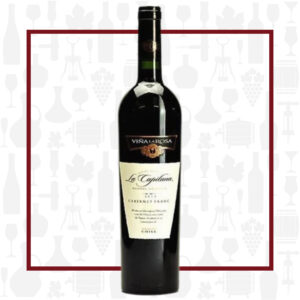Cellar Profile
6th Generation winemakers, the Ossa family, purchased their first parcel of vines in Puemo, Cachapoal Valley in 1824, and are still bottling wines on the estate today. Using a fusion of the most modern techniques, as well as processes steeped in Chilean tradition, Viña la Rosa is one of the most highly-acclaimed Chilean wineries. Puemo is known as one of the best sites on earth for Carménère, and theirs is proof positive of that, with their top bottling, “La Rosa”, displaying the complexity and power the variety can offer when given proper care. Currently under conversion to organic, they have a firm commitment to sustainability, particularly where it comes to their usage of water. Winemaker Gonzalo Carcamo has been at the helm since 2011 and has imprinted his own personal stamp on the wines. Elegance, acidity and fully developed tannins are his hallmarks. The climate is Mediterranean, close to the Pacific Ocean. Stiff breezes during the day and huge temperature shifts in the evenings cool the grapes and allow for a long, slow ripening of the skins. Already well known for producing affordable wines of exceeding quality, Gonzalo’s premium, single vineyard offerings, which retain their price-to-quality ratio, are now the primary focus for the winery.
Region
Puemo is a highly regarded sub-appellation of the Cachapoal Valley. Following the corridor formed by the Cachapoal River, it is inland from the cool Pacific Ocean, allowing for more moderate temperatures than the coast. Its elevation and proximity to the high peaks of the Andes mean that there are huge diurnal temperature drops in the evenings to ensure acid balance. Most of the rains fall during the cool winter months, with frequent periods of drought during the extended growing season. The soils here have a fair amount of clay, with solid water retention, allowing wineries to dry farm if they wish to put the care in.
Vineyard
Started in 1824, the Estate vineyards have been carefully mapped and observed in order to maximize the terroir. Sitting on alluvial soils of granite and sand, with clay, they are maintained ecologically, without pesticides, and farmed using organic principles.
Varieties
Cabernet Franc, one of the key Bordeaux varieties, is actually the parent of the more well-known Cabernet Sauvignon. Needing plenty of sunlight and long hang times, it is particularly suited to moderate or cool climates. The vines can be prone to vigour, so canopy management and keeping crop sizes down is key to avoiding too many green, herbaceous notes. An excellent blending partner, it is rapidly gaining popularity in the New World for its ability to maintain balance, even with occasional elevated alcohol levels.
Winemaking
Hand-harvested from select bunches from the Paso Alto Vineyard. Fermented in stainless steel with daily pumpovers. After malolactic fermentation is complete, the wine is transferred to French oak barriques for a year of aging before being bottled unfiltered.
Tasting Notes
Signature red berry, cedar and herbaceous notes on the nose, this is true Cab Franc. The palate is nervy and fresh, with cherry, raspberry, pomegranate, basil and toasty oak flavours. The tannins are gentle and evolved, but the acids are quite marked, providing balance and vivacity. Chill lightly and enjoy with conversation, or serve with roast pork or chorizo sausages.

 info@buyersandcellars.ca
www.buyersandcellars.ca
info@buyersandcellars.ca
www.buyersandcellars.ca